PATHWAYS



This evening’s event highlights the stories of people who use and run food banks in the Trussell Trust network – while offering a journey of hope towards a better future for all.
Food banks have shown incredible resilience over the past few years – in the face of spiralling levels of destitution, exacerbated by the pandemic and cost of living crisis. They’ve responded to increasingly complex community needs – for example, by providing hot water bottles and ‘cold packs’ (food that doesn’t need cooking) to people unable to heat their homes or use their ovens, or by changing their opening hours to support people in work who are unable to afford the essentials.
People’s circumstances vary, yet a commonality is that 90% of food bank visitors are in receipt of Universal Credit. Therefore, to realise our vision of a more just society, we must work to uplift that basic rate of social security provision, so that everyone can cover the cost of the essentials.
The scale and depth of the challenges facing individuals, food banks and their wider communities can feel overwhelming.
However, I feel a strong sense of hope. If all of us – from people referred to food banks, volunteers and staff, to corporate partners, donors, policy makers and influencers –work together, we can achieve our ultimate vision: ending the need for food banks.
 Danni Malone Chief Network Officer The Trussell Trust
Danni Malone Chief Network Officer The Trussell Trust
The Trussell Trust supports a nationwide network of 1,300 food banks, providing emergency food and practical support to people facing hardship – as well as campaigning for change to end the need for food banks in the UK.
We know that hunger isn’t about food. It’s about lack of income.
The main drivers of food bank use within our network are:
• Problems with the social security system, including delays, deductions, and inadequacies
• Challenging life experiences or ill-health
• A lack of informal or formal support.
Food banks offer incredible service to people facing hardship and will continue to do so for as long as they’re needed. But they shouldn’t be needed to begin with.
In one of the richest nations on earth, it isn’t right that anyone should need to turn to a food bank for support. We are working with our network of food banks, people living in poverty, and partners like you to create lasting change. By working together and forging strong partnerships, we know that a future without food banks is achievable.
As we work towards that future, we will continue to work locally and nationally to tackle the issues driving food bank use –while enabling our network to serve their communities with the best possible practical and compassionate support.
This evening, we explore the reality of hunger and poverty in the UK – viewed through different perspectives shared with us by people with direct lived experience of facing these issues. You will see and hear stories of strength and resilience from people who have faced hardship – and needed to turn to a food bank.
People with lived experience are at the heart of our work. Having lived through the challenges personally, they have the insight and expertise on what the solutions should be. Our lived experience partners choose to work alongside us to shine a light on the reality of poverty in the UK, create understanding and empathy with people who might not have experienced hardship themselves, and help build a movement for change.
Everyone’s journey is unique, so each person’s story is told using their own words. When people share their experiences with us, they have control over where and how
it is shared – to make sure this feels dignified and authentic to them. We hope you’ll stand alongside us in thanking each person who has allowed us the privilege of being part of their story this evening.
As well as being immersed in the perspectives of people who’ve used our food banks, you’ll learn about the major impacts you’ve created through your support – and the action we’re taking to ensure that real change is possible.
creating the pathways needed to effect
This evening, you’ll experience the journey so far, and take that vital first step on to the road ahead. This next stage of the journey will help us build a better future – without a need for food banks.
“ There wasn’t any judgement… just compassion and empathy ”
Steve
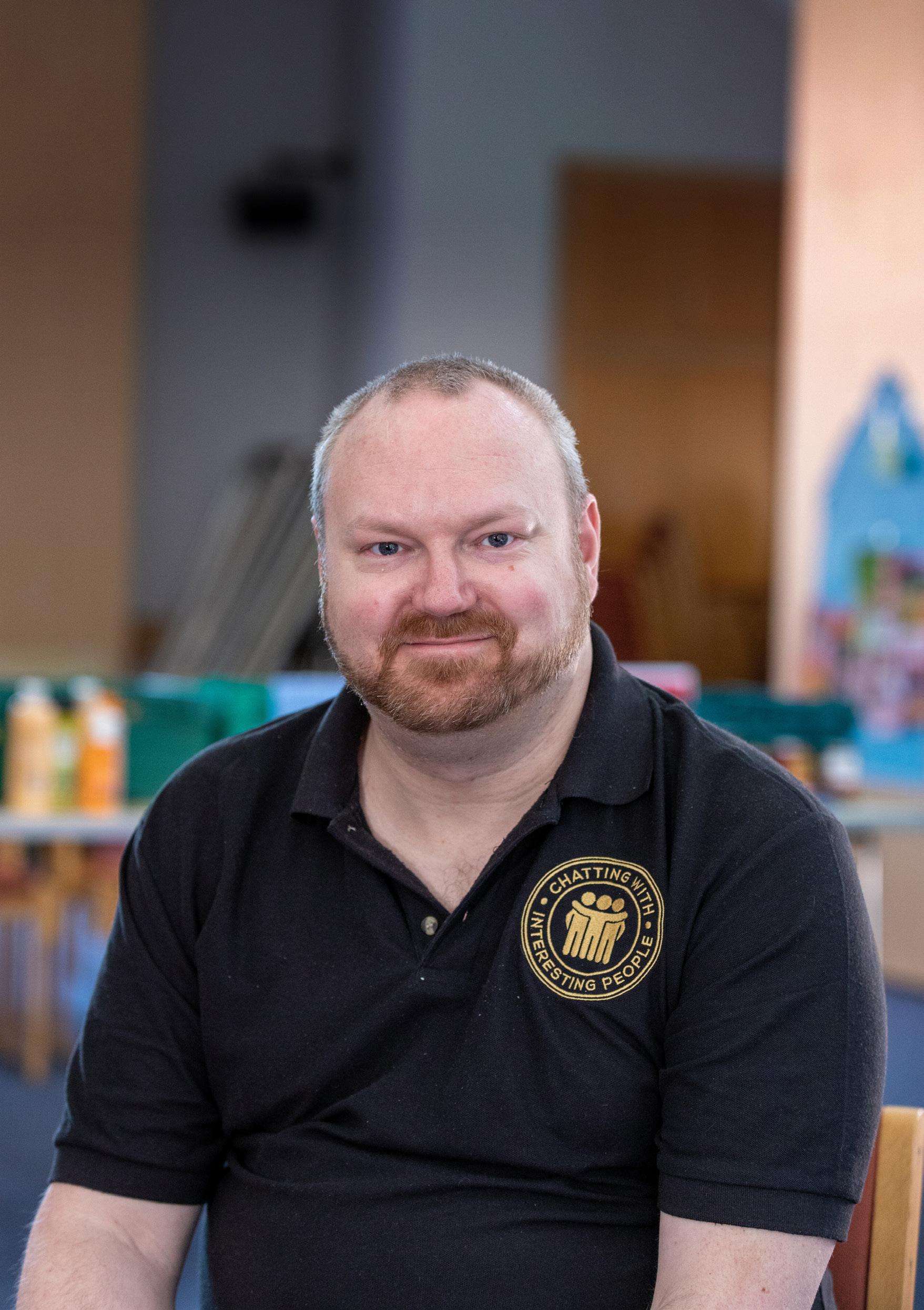
Our Q&A features former food bank user Steve hardship. Steve offers people a listening ear and gives them a voice, explaining that helping others have helped him.
Steve was working in security when he suffered a serious back injury at work. This has affected his health ever since, limiting his mobility and ability to work. Following his injury, Steve began receiving social security payments; however, this was not enough to cover the cost of his essentials. Steve also faced a long wait to receive his payments, which caused additional stress and anxiety. In 2021, Steve was referred to his local food bank in Fulham by a key worker, and he visited the food bank a few times over that summer. He was struck by “how lovely the team were… there wasn’t any judgement, just compassion and empathy.”
By the end of the summer, Steve was able to access more support, and no longer needed to use the food bank. He has since gone on to volunteer at Hammersmith and Fulham Foodbank, helping to support people in his community experiencing financial
Steve wants others to know that things can change.
Steve has used his expertise and experience to help shape multiple projects across the Trussell Trust, continues to share his story to help raise awareness in the media, and is featured in a series of short films, Who Needs Food Banks? – building understanding of the issues that lead to people having to use our network.
In February 2023, we launched our Guarantee our Essentials campaign, in partnership with the Joseph Rowntree Foundation. The campaign seeks to galvanise our communities, supporters and audiences to call on the UK government to ensure everyone has enough money to afford the essentials.
Currently, the social security system is not fit for purpose, with people in receipt of Universal Credit having just £91 a week to live on. This means there is a significant shortfall between people’s living costs and their incomes – forcing many to skip meals, switch off essential appliances such as fridges, and unable to pay essential bills.
More than 150,000 people signed our demand for political leaders to make sure that Universal Credit protects people going without.
Earlier this year, we handed our 150,000-strong petition in to Parliament.
As the petition was submitted, our Chief Executive, Emma Revie, stood alongside food bank users, staff and volunteers – as well as supporters, including actor Charlotte Ritchie from the sitcom Ghosts.
The work is still not done, however, and we continue to call for an essentials guarantee, ensuring that no one has to rely on emergency food.
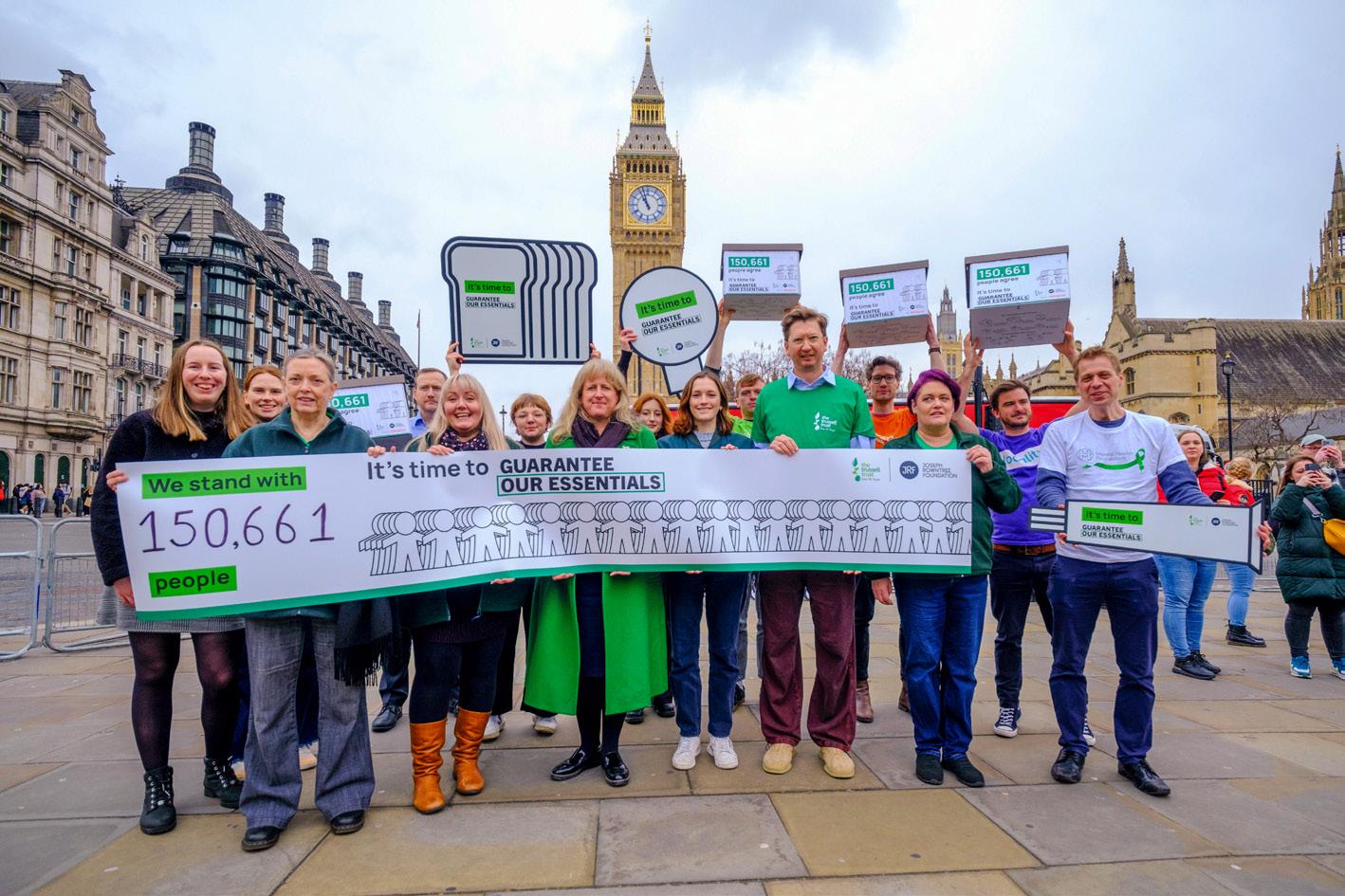
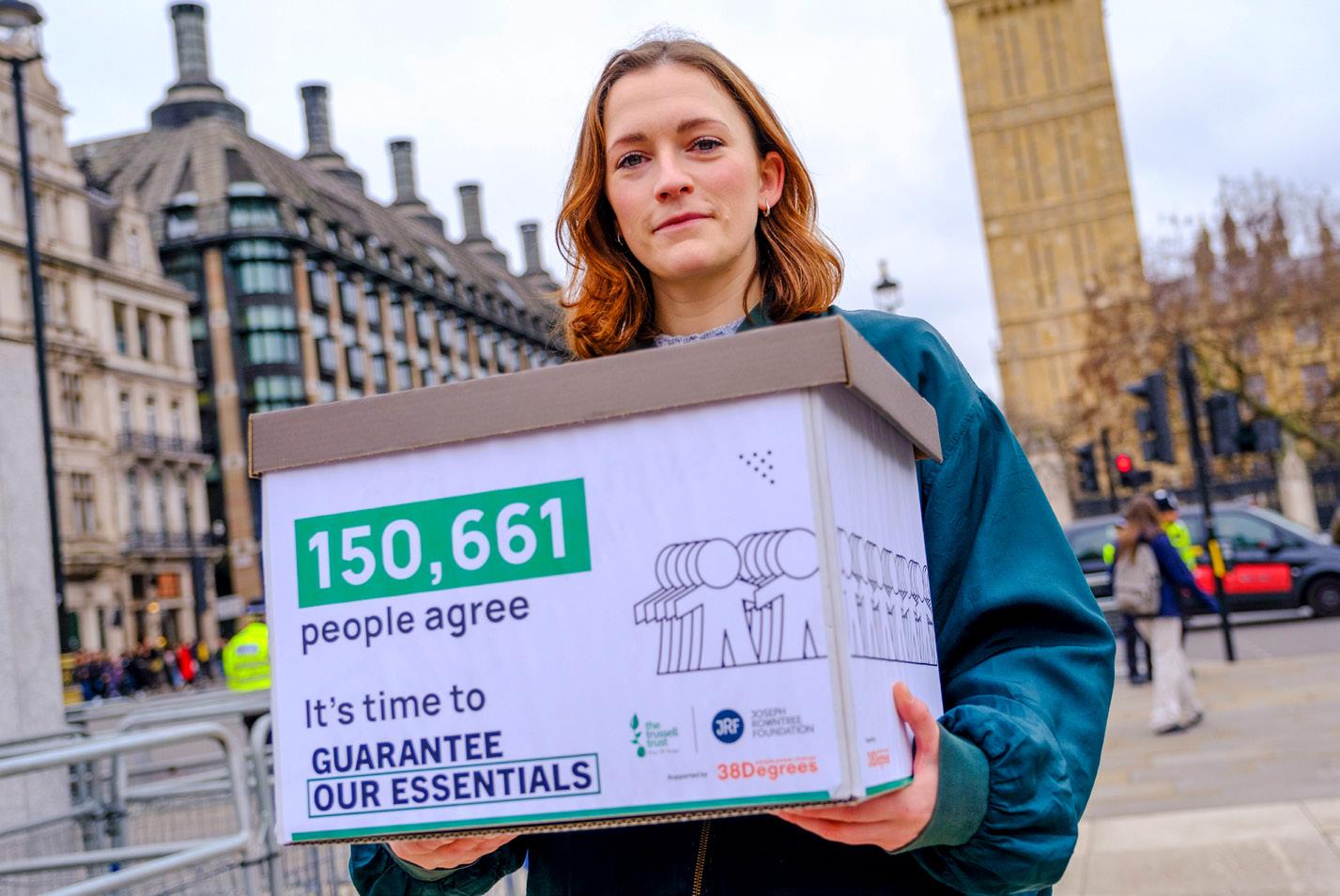
Contemporary Scottish artist
Nick Smith is known for his distinctive, pixelated style based on colour swatches, blending fine art with popular culture. Having exhibited extensively in the UK and the US, and with 12 solo shows to date, he has created two new works for this evening’s event – each combining an image of a tinned Heinz product, alongside text listing the essentials (from food and toiletries to gas and electricity) that so many people are often forced to go without.

Explaining why he chose to collaborate with the Trussell Trust, Nick says: “The Trussell Trust is a hugely important organisation tackling hunger in the UK, and I’ve been a longtime believer in their work.
They don’t just keep food banks running; they’re also committed to addressing the root cause.
This includes advocating for policy changes like ensuring Universal Credit that can adequately cover essentials – food, travel, and bills –helping people to become self-sufficient. I want to raise money but also awareness of their work. Collaboration feels like a perfect fit.”
For more information on Nick Smith’s work, visit: smithandstuff.com
This evening’s event showcases a collection of portraits from photographer John Harrison’s photo-work 12.
The project focuses on food bank volunteers in Blackburn, some of whom were previously food bank users.
Part-funded by The Duchy of Lancaster, 12 will be exhibited as part of the programme of events for The National Festival of Making, alongside personal stories from the project participants.
“Since October 2023, I have been delivering a creative, participatory practice with volunteers at Blackburn Food Bank,” explains John. “We’ve held team meetings, presented project plans, agreed an ethical approach, conducted semistructured interviews, made lots of portrait photography, and held individual sessions with volunteers to select the final images.
The overall presentation aims to provide insight into the motivations, experiences, and opinions of those who provide support in one of the UK’s most deprived wards.”
For more information on John’s work, visit: john-harrison-photo.com/12-2/

The food banks in our network may primarily be about distributing emergency food packages – but a chat with one of our volunteers over a cup of tea can also provide vital respite for visitors. That warm welcome and a space to be heard is often the first time that people feel truly listened to – sharing their experiences and worries while being treated with dignity and respect.
Moreover, these conversations that food bank users have with volunteers can connect them to avenues for advice and support – making it less likely that they’ll need emergency food in the future.
There are many reasons that visitors to our food banks don’t have enough money to cover the essentials. Some people are between jobs, have health conditions or are looking after relatives and children, while some people are in work that’s insecure or doesn’t pay enough to live on.
Barriers like the lack of affordable childcare and transport hold people back from increasing their income, and high housing costs leave people without enough money for other essentials.
A route forward for so many people begins with getting the right support –and the ‘cup of tea moment’ can create those crucial touchpoints, allowing us to signpost people to help, in areas such as housing, mental health, and social security payments.
Our financial inclusion support is especially important, including a dedicated helpline with advice on income maximisation, applying for benefits, social security sanctions and dealing with debt. We also empower our food banks to develop and maintain these services through a range of resilience packages, including crisis response, cost of living and mental health grants.

Once again, our annual statistics show an increase in need for emergency food provision.
In the past year, food banks in the Trussell Trust network distributed more than 3.1 million emergency food parcels to people facing hardship across the UK.
This is the largest number of parcels the network has ever distributed in a single year, and nearly double the number (an increase of 94%) compared to five years ago.
This figure includes more than 1.1 million emergency food parcels for children, with two thirds (65%) of all support provided by food banks in the last year being for families with children.
We also saw a significant increase (of 27% compared to the previous year) in the number of parcels going to pension age households.
In one of the world’s richest economies, this ever-worsening situation is simply unacceptable – a sentiment echoed by the public, with 79% of people agreeing that poverty in the UK is a major problem that needs addressing.
Such high levels of hardship are damaging our nation’s health, holding back our economy, and harming the prospects of our young people.
Our policy-driven building blocks signpost the way to a better future.
It is only through building a society where everyone can afford the essentials that we can unlock the potential in our communities.
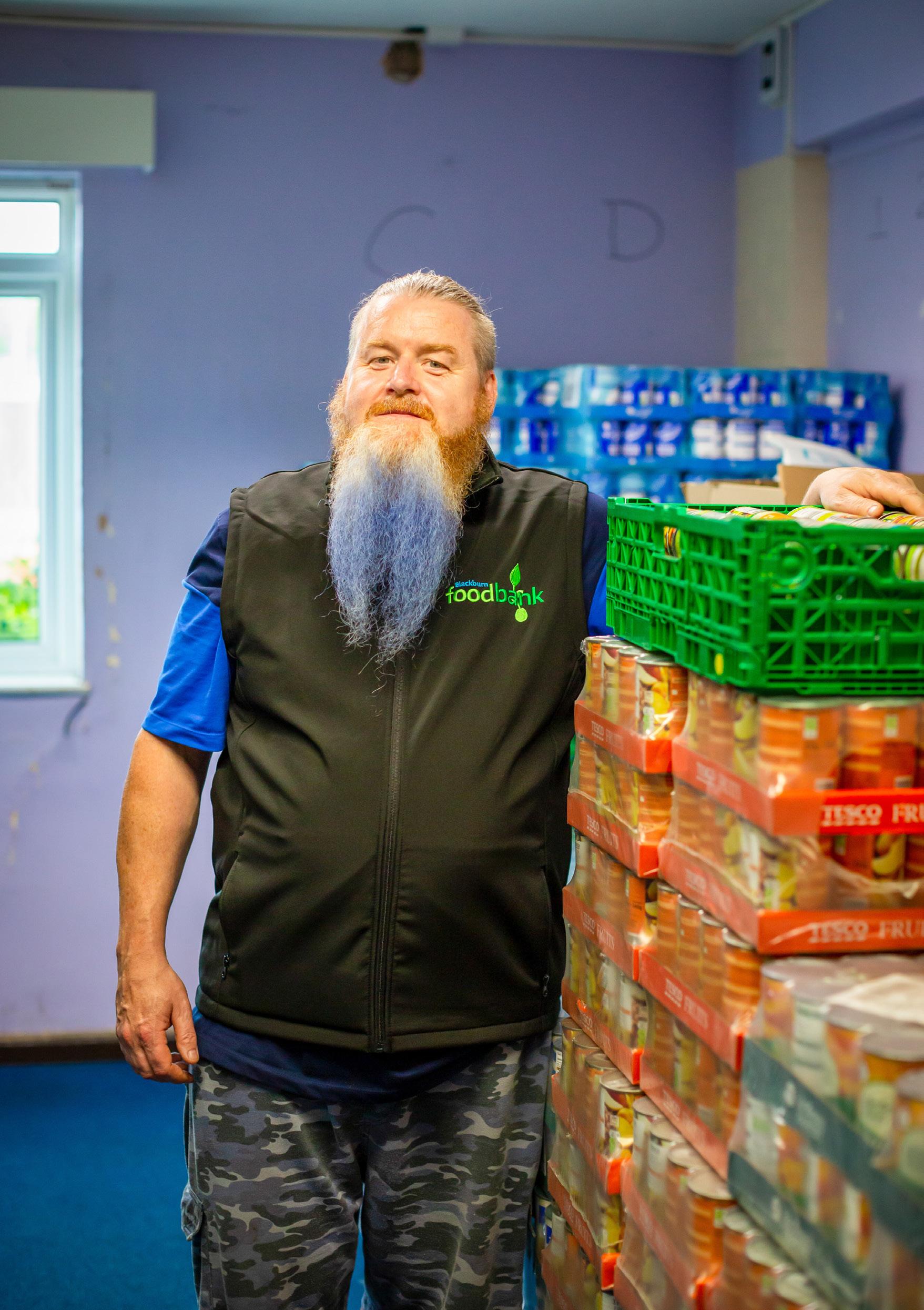
People need to access food banks because they don’t have enough money for the essentials. But all of this can change. We know what measures must be put in place to end the need for food banks, and we know that this goal is achievable if we make the right decisions. We’re keenly aware of the wider structural issues that push people deeper into poverty – which is why we recently developed eight robust, policy-driven building blocks for the future, signposting the way ahead at the end of this evening’s gallery space.
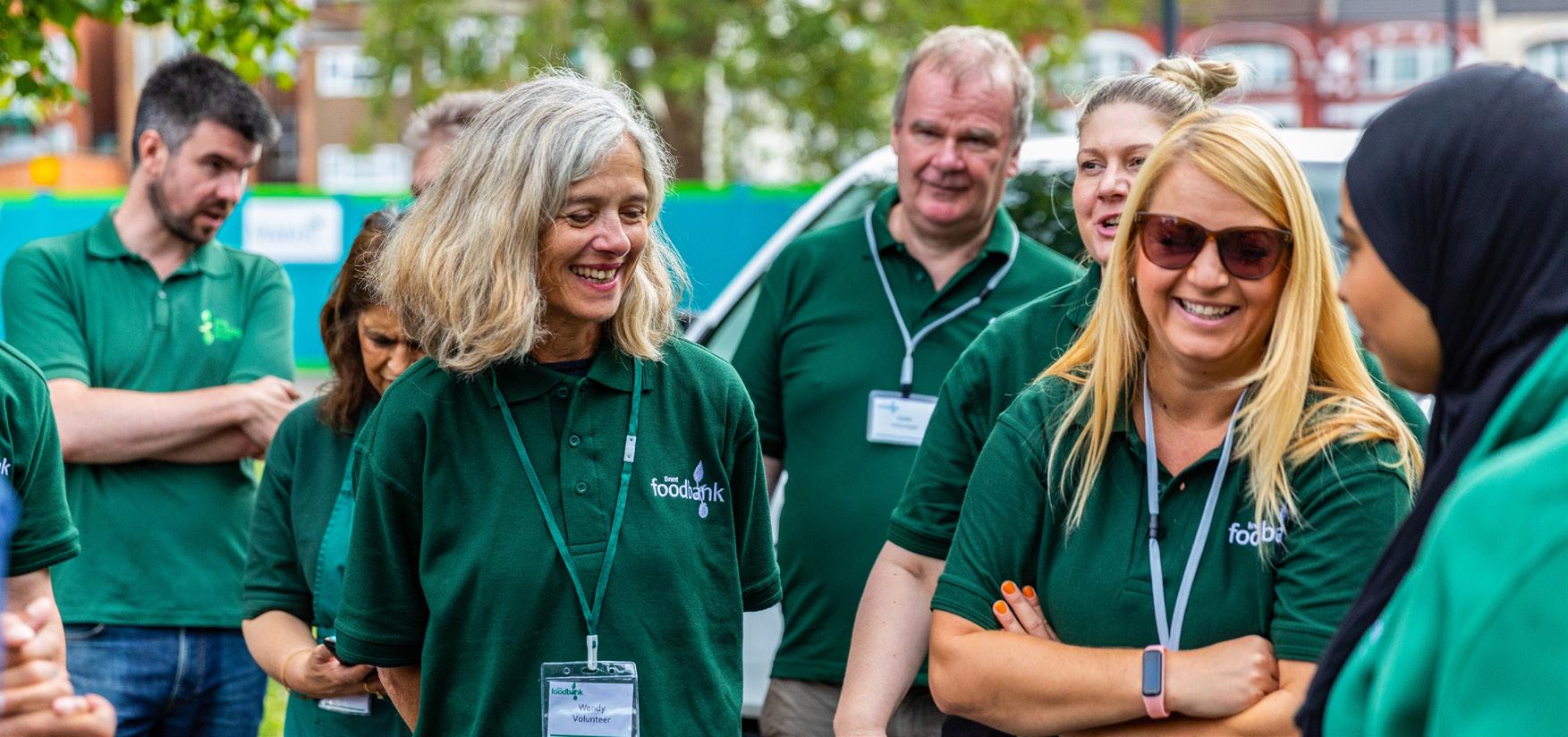
To
end the need for food banks, we need to make sure:
1
2
3
We have a supportive social security system, which ensures everyone can afford the essentials.
Everyone can get the right support at the right time, especially when things are hard. We can do this by ensuring easy access to advice and support on money matters and readily available mental health and trauma-informed support.
People are supported in a way that reflects the reality of their lives, especially if they’re facing higher costs and barriers. We can do this with dignified support for disabled people and people with health conditions, and greater support and value for care and caring.
4
Everyone has the security we all need to access opportunities and have hope for the future. We can do this with decent, secure and rewarding work, safe secure and affordable housing and strong and inclusive communities.
We know what’s pushing people to food banks, so we know the building blocks needed to end hunger – for good.
Your continuing support is hugely appreciated
I would like to express my deepest gratitude to you for attending our Pathways for Change event.
Throughout the evening, we’ve been privileged to hear poignant narratives from individuals and communities across the UK, shedding light on the pressing challenges our network is facing.
Each person who has courageously shared their story has a unique journey that led them to the doors of a Trussell Trust food bank. However, the underlying issues driving poverty in the UK remain the same: people don’t have enough money to afford the essentials, and there’s a critical need for systemic change.
Between April 2023 and April 2024, the Trussell Trust network distributed 3.1 million parcels throughout the UK –a 94% increase compared to five years ago. Despite this surge in need, the thousands of dedicated food bank staff
and volunteers remain unwavering in their commitment to providing compassionate support to people facing hardship. Their resilience in the face of adversity serves as a profound source of inspiration for all of us at the Trussell Trust.
In our collaborative efforts over recent years, we’ve forged new partnerships and fortified our existing relationships, gathering strength from our shared vision: to realise a better future where no one needs emergency food.
Your support continues to be invaluable as we work to end the need for food banks in the UK. Yet it remains concerning that the Trussell Trust and the food banks in our network even exist, in what is one of the world’s wealthiest nations. We must continue to create new pathways for transformative change, exploring different routes to bring about lasting solutions and eliminate the need for food banks in the UK.
I hope you have been inspired by the stories we have shared this evening.
Sadly, for each story shared, there are thousands more stories from people who face the same hardship.
The people behind those stories need us to keep working together – until every last one of us can afford the essentials. Thank you for your support.
Emma Revie Chief Executive Officer The Trussell TrustBarclays are proud to sponsor the Pathways for Change event. The partnership between the Trussell Trust and Barclays aims to build awareness of the help available to people facing financial hardship and increase access to the support to which they’re entitled.
In partnership, the Trussell Trust has been able to continue to help thousands of people navigate the cost of living crisis, maximising their income and working towards a future where everyone has enough money for the essentials.